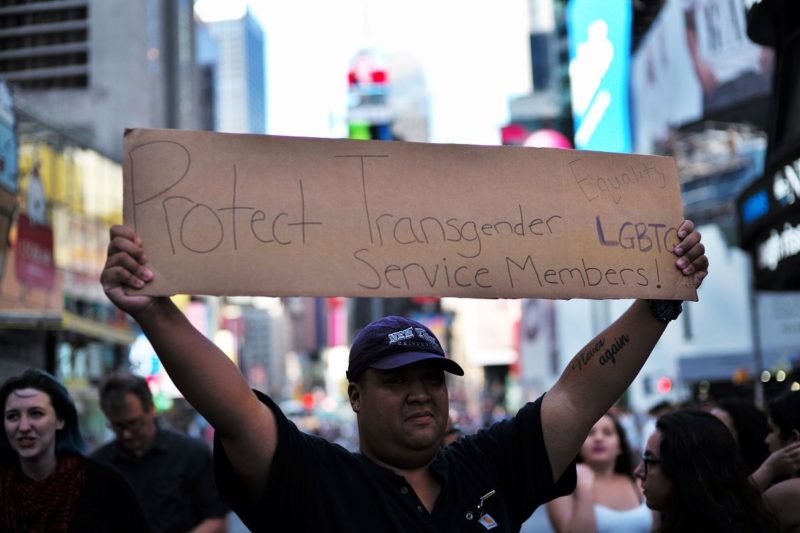The Legal Backlash Against Trump’s Ban on Transgender Troops Has Begun (Updated)
Discharging and replacing an estimated 12,800 transgender service members would cost more than 100 times as much as providing them health care, according to a new study.

Update, August 25, 8:17 p.m.: President Donald Trump signed a memo Friday night banning transgender troops from joining the military and leaving open the question of enlisted trans service members.
President Donald Trump’s July tweets about purging the armed forces of transgender service members has led to widespread criticism, research undercutting Trump’s reasoning for the ban, and at least one lawsuit.
Lawyers from GLBTQ Legal Advocates & Defenders (GLAD) and the National Center for Lesbian Rights (NCLR) filed a federal lawsuit in Washington, D.C., this week on behalf of five transgender service members with nearly 60 years of combined service in the U.S. Air Force, Coast Guard, and Army.
“Trump’s directive to exclude transgender people from military service has created a tidal wave of harms that have already been felt throughout our armed services. Transgender service members have been blindsided by this shift and are scrambling to deal with what it means for their futures and their families,” Shannon Minter, NCLR legal director, said in a statement.
The plaintiffs in Doe v. Trump “face dramatic uncertainty about their futures including the potential loss of their professions, livelihoods, and post-military and retirement benefits,” according to the statement.
Jane Doe 5, for example, has been on active duty with the U.S. Air Force for nearly two decades, serving two tours in Iraq. She notified her command that she is transgender after the Department of Defense announced in June 2016 that it would allow transgender service members to serve openly, and she says she has continued to serve with no issues since. Her “livelihood depends on her military service. Separation from the military would have devastating financial and emotional consequences for her,” the complaint states.
As NPR noted this week, “Trump’s tweets have not yet been translated into a change in policy—the Department of Defense says it is ‘awaiting formal guidance from the White House.’ However, after the announcement the Pentagon did decide to defer the enlistment of new transgender members of the military until Jan. 1, 2018.”
Trump, who avoided military service via medical deferments, cited “tremendous medical costs” in his July 26 tweets as the reason to ban transgender people from the U.S. military.
But discharging and replacing an estimated 12,800 transgender service members would cost more than 100 times as much as providing them health care, according to a new study commissioned by the Palm Center, an independent research institute, and authored by professors at the Naval Postgraduate School.
“The upshot of our analysis is that implementing President Trump’s transgender service ban would cost $75,000 per person in order to accrue an annual savings of $656 per person. For the military as a whole, fully implementing President Trump’s ban would cost $960 million in pursuit of saving $8.4 million per year,” the study concluded.
“If President Trump is truly concerned about the financial costs of transgender service, his announced ban has it exactly backwards. American taxpayers should ask the president, who is proud of his business savvy, why he’s spending a dollar to buy a dime,” said Aaron Belkin, director of the Palm Center and co-author of the study.
A 2015 study by Belkin in the New England Journal of Medicine found that the cost of transition-related medical care would be “negligible” at $5.6 million annually, or 22 cents per member per month. Any attempt to deny them that coverage would be “indefensible and in some cases unlawfully discriminatory,” Belkin wrote.
The Palm Center estimates that average annual transition-related health care would cost $31,931 for each service member who needs it. Many transgender personnel may not need transition-related care during their military careers, which is why the Palm Center puts the average annual cost of transition-related health care for the entire population of transgender troops at only $656 per person.
Jennifer Levi, director of GLAD’s Transgender Rights Project, condemned Trump’s plan to ban transgender people from the military. “This unjustifiable reversal of policy is devastating to these soldiers and harmful to our country. These plaintiffs put their lives on the line every day for all of us. We can’t afford to lose a single one of them,” she said in a statement.
The American Civil Liberties Union (ACLU) called Trump’s ban “an outrageous and desperate action” and has threatened to sue if the policy is implemented.
“The thousands of transgender service members serving on the front lines for this country deserve better than a commander-in-chief who rejects their basic humanity,” said Joshua Block, senior staff attorney with ACLU’s LGBT & HIV Project, in a statement. “This has been studied extensively, and the consensus is clear: There are no cost or military readiness drawbacks associated with allowing trans people to fight for their country. The president is trying to score cheap political points on the backs of military personnel who have put their lives on the line for their country.”
SPARTA, the largest organization of transgender Americans serving in the U.S. Armed Forces, said in a statement that transgender service members “are and have always been soldiers, sailor, airmen, Marines, and Coast Guardsmen first. We serve our country honorably, in good faith. We will continue to do so until we are told it is time to go.”
Despite the numbers, far-right attacks on transgender rights continue. A statement from the Liberty Counsel, a conservative nonprofit that supports reversing the Obama-era military policy, says that the military “is no place for radical social ideological agendas.”
